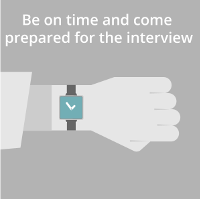Preparing for an interview
Watch and get a few tips from recruitment specialists.
Nail your job interview: 5 steps to success
Well done! Your CV was perfect and you’ve been called for the interview. You may be feeling a range of emotions by now: excited one minute and a bundle of nerves the next. Don’t worry, we’ve prepared a five-step plan to help you through this process.
- Step 1: Research
- Step 2: Know yourself
- Step 3: Prepare interview questions
- Step 4: Look good
- Step 5: Be prepared
 Step 1: Research
Step 1: Research
When you have a job interview scheduled, you need to know much as possible about the company.
- Do research about the history of the company.
- Know about the owner of the company and in which sector the company is registered.
- Understand the organisation’s goals and values as the interviewer may decide to ask you about it.
- Know which departments the business has and where you’ll fit in.
Knowing these important details will help you create questions that you’d like to ask the interviewer and give you confidence.
Step 2: Know yourself
When an interviewer asks about who you are, it can get awkward, if you don’t know what to say. Here’s how you can answer this question:
Don’t use clichés. Avoid saying things like, “I am a fun-loving person who enjoys reading.” That’s great, but you’ll need to capture the interviewer’s attention. Try saying something that will help you stand out like, “I can describe myself using three words…” or start by referring to something you enjoy, “I’m a lot like my favourite musician…”
It always helps to be creative and show some personality. You don’t need to memorise your answer but take time to prepare possible answers for this question.
Step 3: Prepare interview questions
Asking questions lets the interviewer know that you’re interested. Here are some questions you could ask and some you should avoid during your job interview:
Do ask:
- About the responsibilities you’ll have. This shows that you’re interested and thinking about how you could use your skills to benefit the company.
- What “success” means to the employer. It lets the employer know that you could help solve problems.
- About the team. Ask the interviewer about the team you’ll work with and how you fit in.
Don’t ask:
- About the interviewer’s religious beliefs or political stance. You may disagree, so avoid disagreements at all costs.
- Whether you’ll get a bonus, benefits or anything salary-related. Save your salary negotiations for the second interview or until the interviewer brings it up. However, you will need to know your salary details before you sign a contract.
Things you should already know. Never ask the interviewer information about the company that you should have picked up during your research before the interview. It may create the impression that you’re not serious about the job.
 Step 4: Look good
Step 4: Look good
Finding an outfit for your job interview needn’t be a headache. When you research the company, you could call the company secretary to ask about the work dress code.
Once you’ve established the company culture, choose an outfit that is smart but not too casual. You want to create a good first impression:
- Iron your clothes and do not wear anything that wrinkles easily.
- Keep your hair neat and presentable.
- Be well-groomed and shave if necessary.
- Always dress professionally and do not wear anything too revealing.
- Wear clothes that fit properly.
- Opt or neutral colours such that are not too distracting.
 Step 5: Be prepared
Step 5: Be prepared
Here are five essential tips to help you before your job interview:
- Before planning your trip, find out where exactly the interview will be conducted.
- Arrive at least 15 minutes before the interview. Do not be too early as the interviewer may have other things to do.
- If you need to present a portfolio or any additional documentation, prepare these before your interview.
- Take a bottle of water, a pen and a notebook. Keep your documents and notebook in a folder.
- It is better to keep your things in a bag rather than your hands or your pockets.
- Lastly, remember to keep calm. You’ve done your research and you look amazing. You would not have landed the interview if they didn’t think you had the potential.
The content on this page was last updated on 2 March 2022


